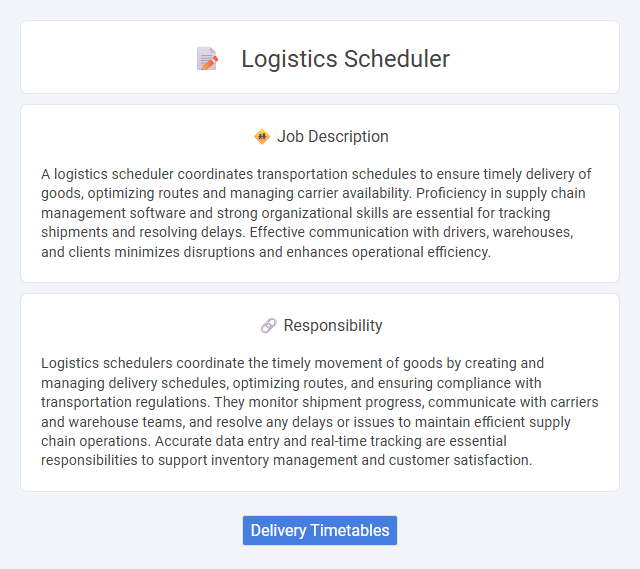
A logistics scheduler coordinates transportation schedules to ensure timely delivery of goods, optimizing routes and managing carrier availability. Proficiency in supply chain management software and strong organizational skills are essential for tracking shipments and resolving delays. Effective communication with drivers, warehouses, and clients minimizes disruptions and enhances operational efficiency.
Individuals with strong organizational skills and the ability to handle high-pressure situations are likely to be well-suited for a logistics scheduler role. Those who thrive in fast-paced environments and can communicate effectively with diverse teams may find this job aligns with their strengths. People prone to stress or difficulty managing multiple tasks might experience challenges in maintaining the efficiency required for this position.
Qualification
A Logistics Scheduler typically requires a high school diploma or equivalent, with many employers preferring candidates holding a bachelor's degree in supply chain management, logistics, or business administration. Proficiency in transportation management systems (TMS), strong analytical skills, and experience with scheduling software are essential qualifications. Effective communication and problem-solving abilities, along with knowledge of inventory management and regulatory compliance, enhance job performance in this role.
Responsibility
Logistics schedulers coordinate the timely movement of goods by creating and managing delivery schedules, optimizing routes, and ensuring compliance with transportation regulations. They monitor shipment progress, communicate with carriers and warehouse teams, and resolve any delays or issues to maintain efficient supply chain operations. Accurate data entry and real-time tracking are essential responsibilities to support inventory management and customer satisfaction.
Benefit
A logistics scheduler job likely offers benefits such as improved operational efficiency and streamlined supply chain processes. Professionals in this role probably experience reduced delivery delays and better resource allocation, enhancing overall customer satisfaction. Increased accuracy in scheduling may lead to cost savings and optimized workforce management.
Challenge
Logistics scheduler roles often involve managing complex and dynamic schedules that require constant adjustment to meet tight deadlines and shifting priorities. The probability of encountering unexpected delays, such as transportation disruptions or inventory shortages, is high, demanding quick decision-making and problem-solving skills. Balancing multiple stakeholders' demands increases the challenge of optimizing routes and resource allocation while maintaining efficiency and cost-effectiveness.
Career Advancement
A logistics scheduler plays a crucial role in coordinating supply chain operations, optimizing delivery routes, and managing inventory flow to ensure timely shipments. Mastery in logistics software, data analysis, and communication enhances efficiency, providing a strong foundation for career advancement into roles like logistics manager, supply chain analyst, or operations director. Continuous skill development and certifications such as APICS CPIM or Six Sigma further accelerate growth opportunities in the logistics and supply chain management field.
Key Terms
Delivery Timetables
Logistics schedulers play a critical role in creating and maintaining efficient delivery timetables to ensure timely shipment arrival. They analyze route data, traffic patterns, and transportation constraints to optimize delivery windows and reduce delays. Accurate scheduling enhances supply chain reliability and improves customer satisfaction by providing predictable delivery timelines.
 kuljobs.com
kuljobs.com